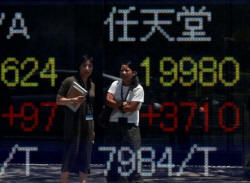|
Global stocks hit
eight-month highs ahead of BoE Brexit response
 Send a link to a friend
Send a link to a friend
 [July 14, 2016]
By Marc Jones [July 14, 2016]
By Marc Jones
LONDON (Reuters) - World shares hit an
eight-month high on Thursday as the Bank of England prepared to
deliver its Brexit defense plan, a move investors believe could set
off another round of global central bank- and government-led
stimulus.
Talk of more action from Japan had lifted sentiment ahead of a BoE
policy statement, and European markets opened with shares up 1
percent, bonds in reverse and sterling and the euro firm against the
dollar and the yen.
Most economists polled by Reuters expect the BoE will cut rates to a
record low of 0.25 percent, followed by a reactivation - probably in
August - of the QE bond-buying program it adopted as the financial
crisis raged in early 2009.
Mark Carney, the head of the BoE has said he is not a fan of the
negative interest rates the European Central Bank and the Bank of
Japan are employing, so the scale and shape of BoE 'QE2' has become
the focus for financial markets.
"Having already seen Carney come out of the gate early, we are for
sure going to see something from the BoE," said Aviva Investors'
head of rates Charlie Diebel.
"The question really is whether we get shock and awe and they cut by
40 basis points and start talking about credit easing (QE or further
cheap loan offers), or we get something a bit more measured."

The pound was up at $1.3220 ahead of the 1100 GMT (07:00 a.m. EDT)
BoE decision, off the $1.3340 hit on Wednesday after Theresa May was
installed as UK prime minister to end fears of a drawn-out
Conservative leadership battle.
The yen was the day's big currency mover.
It fell to 105.54 yen per dollar <JPY=> down 4 percent since the
start of the week, which if it holds will be the sharpest drop since
1999 and the sixth biggest since the end of the Bretton Woods era
over 40 years ago.
Helping fuel the move was a report that former U.S. Federal Reserve
Chairman Ben Bernanke had floated the idea of perpetual bonds with
one of Prime Minister Shinzo Abe's key advisers in April.
Abe called for fiscal stimulus, expected to reach about 2 percent of
GDP, following an upper house election victory that strengthened his
grip on power on Sunday.
"We've heard a lot of talk about fiscal policy out of Japan.
Something will happen on that front. The big question is whether
there will be further monetary easing and coordination of the two,"
said Societe Generale's Alvin Tan.
[to top of second column] |

Share price of Japan's Nintendo Co. (R) is displayed at a stock
quotation board outside a brokerage in Tokyo, Japan July 11, 2016.
REUTERS/Issei Kato

EMERGING SURGING
The pan-European STOXX Europe 600 and the FTSEurofirst 300 indexes were up
1.1 percent and 1.0 percent respectively in early deals, at their highest since
June 23, when Britons voted to leave the European Union.
Wall Street futures pointed to U.S. markets adding to their record highs later
too, and among commodities Brent oil prices bounced back to $46.50 per barrel
after losses of over 4 percent on Wednesday.
Emerging markets remained firmly on the front foot as they continued to benefit
from the prospect of more cheap money from big central banks.
Like MSCI's 46-country All World index, EM stocks <.MSCIEF> were at eight-month
highs after a searing bond rally too in recent weeks.
Malaysia's ringgit hit a 10-week high as the government bond prices extended
gains after a surprise interest rate cut on Wednesday.
The South Korean won. also touched its strongest level in more than 10 weeks
after Bank of Korea kept its rates unchanged and investors bought the won versus
the weakening yen.
"This is a yield-hungry environment and EM does stack up as an asset class that
does offer yield," said Steve Ellis, a portfolio manager at Fidelity
International.
(Reporting by Marc Jones; editing by John Stonestreet)
[© 2016 Thomson Reuters. All rights
reserved.] Copyright 2016 Reuters. All rights reserved. This material may not be published,
broadcast, rewritten or redistributed.

 |